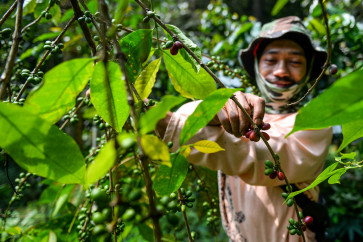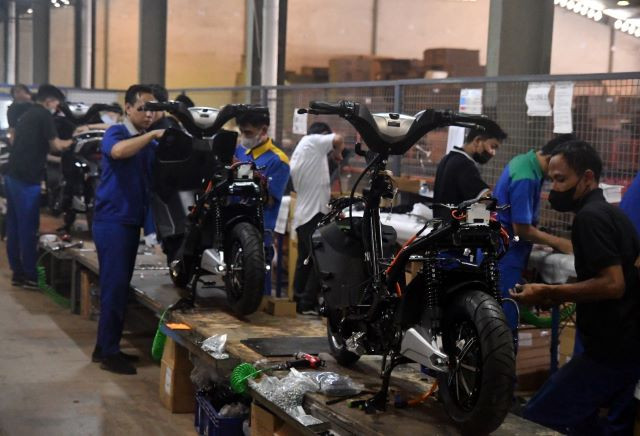Of dim sum and wines made in Hong Kong
Think local: Grapes from aboard are pressed, fermented and aged at The 8th Estate Winery in Hong Kong
Change text size
Gift Premium Articles
to Anyone
 Think local: Grapes from aboard are pressed, fermented and aged at The 8th Estate Winery in Hong Kong. (JP/Pandaya) (JP/Pandaya)
Think local: Grapes from aboard are pressed, fermented and aged at The 8th Estate Winery in Hong Kong. (JP/Pandaya) (JP/Pandaya)
Think local: Grapes from aboard are pressed, fermented and aged at The 8th Estate Winery in Hong Kong. (JP/Pandaya)
Among world travelers ' from the backpackers to the big spenders ' Hong Kong is famous as a haven for wining and dining, offering everything from unpretentious roadside cafes to award-winning upscale establishments.
Recently, we started a culinary tour by exploring the late-night noodle haunt of Wan Chai, where foodies can find small family food stalls that are open well past midnight, as well as international franchises and small Chinese restaurants that offer a wide choice of Cantonese cuisine featuring dishes that they claim are original.
Wan Chai, one of the first settlement areas in Hong Kong, is where the elite once concentrated on hills overlooking the sea. It remains a good place to hang out and have a late supper in the small restaurants lining the streets.
Menus are dominated by noodles that are served with fish, beef or pork in endless variations. Since few patrons were on hand during our visit, the food we ordered came fast and steaming ' offering us a good way to stay awake despite the odd hour.
The next day, we were delighted when our guide told us that we would have lunch at the city's top dim sum restaurant after a visit to Comix Home Base. For Chinese food lovers, dim sum is a delicacy never to be missed ' especially when you are in its native land, Hong Kong.
In Jakarta, dim sum, which literally means 'touch the heart', is usually served as a snack as the name suggests. In Hong Kong, however, a greater variety of savory dumplings are also served ' as a main course and the portions are larger.
Our quest for dumplings took us to Cuisine Cuisine, a Cantonese restaurant on the 3/F floor of The Mira Hong Kong on Nathan Road. It is an upscale restaurant that received one star from Michelin. Dim sum is its signature dish.
In case you are not familiar with the term 'Michelin star', you can be forgiven, as it is rarely heard in Indonesia. For those in the know, however, a Michelin star is a hallmark for fine dining.
Started by the famed French tire maker in 1926, the Michelin system awards from zero to three stars based on the comments of anonymous reviewers who focus on quality, mastery of technique, personality and consistency of the food. Interior and decor do not count.
Presenting itself as a showcase of Cantonese dining traditions, Cuisine cuisine boasts cozy and modern interior with exclusive rooms for more private dining. There is also a nice view of Kowloon Park.
The large variety of the yummy dumplings that kept appearing on our table explained why dim sum is so much more than a snack.
On the menu were 20 all-you-can-eat Cantonese dim sum selections for HK$248 (Rp 360,000), including steamed shrimp dumplings and steamed minced chicken and shrimp dumplings with crab roe. You might also try steamed 'Xao Long Bao' Shanghai-style pork soup dumplings or more contemporary creations, such as taro puffs with diced chicken and foie gras.
At the end of the lunch, when most of the diners at the table had already given up and leaned back, master chef Ringo Wong appeared to share his experience and expertise ' as well as to apologize for not fulfilling a promise to take us to his kitchen.
'It was not possible, because our high standard of hygiene doesn't allow visitors,' Ringo said through an interpreter. In its search for top-quality authentic Cantonese fare, Cuisine cuisine's master chefs never stop seeking original recipes and invent new unique ingredients, he added.
For wine lovers, Hong Kong has a sweet-and-sour surprise. The arid, hilly territory, which has little arable land and no vineyards, now has its own The 8th Estate Winery.
After cruising and asking around for directions, we eventually arrived at the third floor of an old industrial building at Ap Lei Chau, where Lysanne Tusar, the winery's founding director, was waiting for a tasting session of locally made wines in a bar filled with oak barrels.
With an annual production capacity of 40,000 bottles, the winery opened to the public in December 2008, offering red, white and dessert varietals. Most of its products are ready for sale. It aims to boost annual production to 100,000 bottles for individual customers.
Patrons visiting the establishment might wonder how on earth can The 8th Estate make wine in a crowded cosmopolitan city.
Tusar explained that the establishment sources grapes from the US, Europe and Australia. Its people go to the grape-growing countries to assess the fruit's quality and harvest. They freeze the produce and ship it back to The 8th Estate, where it is pressed, fermented, bottled and aged in the tall building that stands next to a high hill.
'For our 2007s, we got our grapes from Washington state [in the US], as we thought it was a good year,' Tusar says.
The 8th Estate sells not only the conventional finished products but also offers customized wines. Following the direction of professional winemakers, customers can prepare their own concoctions from the varietals sold by the barrel. This is only for serious wine lovers, however. A single barrel that can yield 280 bottles costs at least HK$66,000.
To quench our curiosity, Tusar uncorked several 2007 bottles of Sauvignon Blanc and a less sweet Chardonnay.
The winery was established in February 2008, making the best of a government's policy to slash tariffs on imported wine to 40 percent from 80 percent in 2007.
Business started booming in 2008 after Hong Kong eliminated the duties altogether ' a policy intended to support the territory's ambition to become Asia's wine distribution hub. Hong Kong trade officials estimate that the wine market in Asia will grow by up to 20 percent a year, reaching US$27 billion by 2017.
The 8th Estate has been growing in popularity and its bottles are currently stocked in Hong Kong's Michelin-star establishments, side by side with globally established vintages such as Bordeaux, Lindeman and Hardy's.
The 8th Estate Winery shows how Hong Kong's ambitions to become a wine distribution hub have spurred a flourishing wine scene. Auction houses hold multi-million-dollar sales, while neighborhood wine shops have sprung up, along with wine exhibitions and tastings.
When in Hong Kong, you can order a bottle of wine for an affordable price for the perfect complement to your dinner, rather than as a marker of social status.
By the way, please go ahead and indulge: There is no branch office of the FPI in Hong Kong.
The writer recently visited Hong Kong on the invitation of the city's tourism board.









